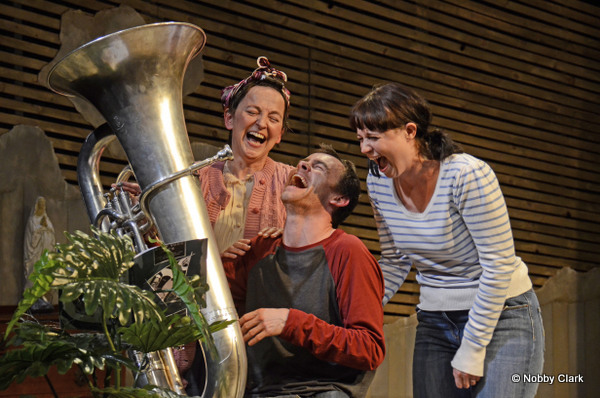 In many ways the small(ish) independent, itinerant theatre companies have picked up the dusty baton of the old rep companies and are carrying on the good work. Many of these companies are producing work which compares with the best established and permanent companies in the land. We all know of the qualities of Propeller, and Kneehigh moved into a different league with their recent production of Tristan and Yseult. Northern Broadsides is another excellent, though slightly smaller company based in Yorkshire.
In many ways the small(ish) independent, itinerant theatre companies have picked up the dusty baton of the old rep companies and are carrying on the good work. Many of these companies are producing work which compares with the best established and permanent companies in the land. We all know of the qualities of Propeller, and Kneehigh moved into a different league with their recent production of Tristan and Yseult. Northern Broadsides is another excellent, though slightly smaller company based in Yorkshire.
The main difference between these touring companies and late lamented reps, apart from not having a permanent home, is that they can be very choosy about which plays they present; they are not forced to put on the pot-boilers. Although many of them sometimes choose to present “classic” plays, in the sense of well known and often well tried pieces, it is always the case that their adaptations are original and unique. Northern Broadsides’ current production of The Grand Gesture at the Everyman this week is a case in point.
Written as The Suicide in the mid-1920s by Russian playwright Nikolai Erdman it was never performed in that country until 1982. Of course, it can be seen as a satire on the communist state, but probably more accurately as a portrayal of selfishness and the less attractive aspects of human nature. There has yet to be a political party or regime that has been able or willing to accommodate the way we really are.
The Grand Gesture concerns an unemployed young man, Simeon Duff, supported in a shabby boarding house by his working wife. Although a sympathetic and likeable character Simeon is not without fault. After reading an advert in the paper he sees his salvation in music and decides to take up the tuba, discovering that jobbing musicians can make good money. However, his plans are cruelly thwarted when he realises that first he must learn to play the instrument – much too much like hard work. In desperation, as one does, he says everyone will be better off he kills himself. Immediately the vultures gather, each seeing how the suicide of this unfortunate nobody can be of benefit to them. They each, for their own reason, persuade him to make the grand gesture of the title and sacrifice himself for the good of others – namely themselves.
As I have said before on these pages, often the best way to make a serious point is with a good laugh. The Grand Gesture is, if nothing else, a very funny comedy bordering at times on farce. Michael Hugo was a very likeable Simeon who tugged at the heart-string despite his lack of application on the tuba. I particularly liked Robert Pickavance as the intellectual who saw the suicide as a grand gesture to creative art along the lines of the romantic poets. Alan McMahon, who many will remember as one of the Ugly Sisters in Cinderella at the Everyman a couple of years ago, was suitably sozzled and seedy as the local priest who also saw something to be gained from poor Simeon’s demise. The religious aspect was further explored by Angela Bain’s wonderful portrayal of the Irish mother-in-law who had a saint for every occasion and an occasion for every saint.
Is it necessary to know the original or be aware of its context within Stalinist Russia? Probably not. The play is about human nature, about selfishness and exploitation. The only character who is overtly political is the postman but he fails to see anything because he only looks at things, as he constantly reminds us, “from a Marxist viewpoint”.
The Grand Gesture can be enjoyed on many levels. First and foremost it succeeds brilliantly as a broad comedy with some great characters. However, if you want to delve deeper, there’s plenty more to think about. Like all good comedy, it’s the underlying serious bits that give it its power. Highly recommended. – Michael Hasted

